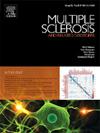The effects of online pilates training on cognitive functions and dual task performance in people with multiple sclerosis: A randomized controlled study
IF 2.9
3区 医学
Q2 CLINICAL NEUROLOGY
引用次数: 0
Abstract
Background
Cognitive impairments in people with multiple sclerosis (PwMS) are common and aggravate dual-task (DT) performance. This study aimed to investigate the effectiveness of online Pilates training on cognitive functions and the DT performance of balance, walking, and functional mobility in PwMS.
Method
In this randomized controlled trial, forty-six PwMS were recruited and randomly allocated into two groups. The Online Pilates group (OPG) received Pilates training via videoconferences three days per week during six weeks at home. The control group (CG) was a waitlist with no Pilates treatment. Cognitive Functions were assessed with Montreal Cognitive Asssessment (MoCA), The Trail Making Test (TMT), and The Stroop Test (ST). DT performance was assessed with mental tracking and verbal fluency during postural stability (PS), walking, and functional mobility.
Results
At the end of six weeks, the interaction effects (time × group) revealed significant differences for MoCA (p = 0.024), TMT-B (p = 0.012), ST (p ≤ 0.012), PS-with mental tracking (p = 0.004), PS-with verbal fluency (p = 0.003), cadence-with mental tracking (p = 0.048), and functional mobility-with mental tracking (p = 0.043) in favor of the OPG. Additionally, MoCA, TMT, ST, and DT performance during balance and functional mobility significantly improved in after six-week online Pilates training, but did not in CG.
Conclusion
Pilates training via videoconference was effective in the improvement of cognitive functions and DT performance in PwMS. Online Pilates may be considered for improving cognitive impairments and DT performances in PwMS with barriers to accessing clinics.
Trial registration
ClinicalTrials.gov: NCT06462339
在线普拉提训练对多发性硬化症患者认知功能和双重任务表现的影响:一项随机对照研究
认知障碍在多发性硬化症(PwMS)患者中很常见,并且会加重双任务(DT)的表现。本研究旨在探讨在线普拉提训练对PwMS认知功能和DT平衡、行走和功能活动能力的影响。方法随机对照试验,选取46例PwMS患者,随机分为两组。在线普拉提组(OPG)通过视频会议接受普拉提训练,每周三天,为期六周。对照组(CG)是未接受普拉提治疗的候补组。采用蒙特利尔认知评估法(MoCA)、The Trail Making Test (TMT)和The Stroop Test (ST)评估认知功能。在姿势稳定性(PS)、行走和功能活动中,DT表现通过心理跟踪和语言流畅性进行评估。结果6周后,交互效应(时间×组)显示MoCA (p = 0.024)、TMT-B (p = 0.012)、ST (p≤0.012)、ps -伴心理追踪(p = 0.004)、ps -伴言语流畅性(p = 0.003)、节奏-伴心理追踪(p = 0.048)、功能流动性-伴心理追踪(p = 0.043)均有利于OPG。此外,MoCA, TMT, ST和DT在平衡和功能活动方面的表现在六周的在线普拉提训练后显着改善,但在CG中没有。结论视频会议普拉提训练能有效改善PwMS患者的认知功能和DT表现。在线普拉提可能被认为是改善认知障碍和DT表现的障碍进入诊所的PwMS。临床试验注册:NCT06462339
本文章由计算机程序翻译,如有差异,请以英文原文为准。
求助全文
约1分钟内获得全文
求助全文
来源期刊

Multiple sclerosis and related disorders
CLINICAL NEUROLOGY-
CiteScore
5.80
自引率
20.00%
发文量
814
审稿时长
66 days
期刊介绍:
Multiple Sclerosis is an area of ever expanding research and escalating publications. Multiple Sclerosis and Related Disorders is a wide ranging international journal supported by key researchers from all neuroscience domains that focus on MS and associated disease of the central nervous system. The primary aim of this new journal is the rapid publication of high quality original research in the field. Important secondary aims will be timely updates and editorials on important scientific and clinical care advances, controversies in the field, and invited opinion articles from current thought leaders on topical issues. One section of the journal will focus on teaching, written to enhance the practice of community and academic neurologists involved in the care of MS patients. Summaries of key articles written for a lay audience will be provided as an on-line resource.
A team of four chief editors is supported by leading section editors who will commission and appraise original and review articles concerning: clinical neurology, neuroimaging, neuropathology, neuroepidemiology, therapeutics, genetics / transcriptomics, experimental models, neuroimmunology, biomarkers, neuropsychology, neurorehabilitation, measurement scales, teaching, neuroethics and lay communication.
 求助内容:
求助内容: 应助结果提醒方式:
应助结果提醒方式:


